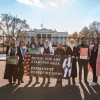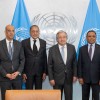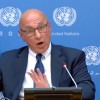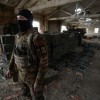Israel-Palestine war
UN Secretary-General Rebukes False Claim Regarding Hamas Attacks

In a dramatic turn of events at the United Nations, Secretary-General António Guterres has vehemently rebuked claims by Israeli diplomats that he sought to justify the terror attacks carried out by Hamas on October 7th. Addressing a debate in the UN Security Council on the escalating crisis in Israel and Palestine, Guterres clarified that he never condoned the "appalling" attacks by Hamas and emphasized that they could not be justified.
The context of this dispute arises from Guterres' remarks during the Security Council session. While he condemned the Hamas attacks that led to the siege and bombardment of Gaza, he also stressed that these events did not happen in isolation and should not be used to justify the collective punishment of Palestinians.
Israel's ambassador to the UN, Gilad Erdan, took issue with Guterres' speech, claiming that it effectively justified Hamas's brutal assault, which resulted in the deaths of approximately 1,400 people, the majority of them civilians. Erdan even went so far as to demand Guterres's resignation and announced that Israel would withhold visas from UN officials.

Furthermore, Israel's Foreign Minister Eli Cohen accused Guterres of justifying terrorism and canceled a planned bilateral meeting with the UN chief.
In response to these allegations, Secretary-General António Guterres met with the families of those who were taken hostage by Hamas fighters. He reaffirmed his call for the immediate and unconditional release of all those held in violation of international law within Gaza.
In a statement delivered at the stakeout outside the Security Council on Wednesday morning, Guterres expressed his shock at the misrepresentation of his statement by some parties. He acknowledged that he had indeed referred to Palestinian grievances but stressed that he had also stated unequivocally in the Council that "the grievances of the Palestinian people cannot justify the appalling attacks by Hamas."
While Guterres did not explicitly refer to Israeli diplomats, he emphasized the need to set the record straight, especially out of respect for the victims and their families. This clash over interpretation and rhetoric underscores the complexity and sensitivity of the situation in the region and the challenges faced by international leaders attempting to navigate this longstanding conflict.
































